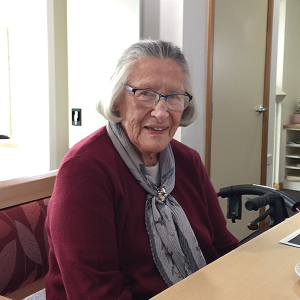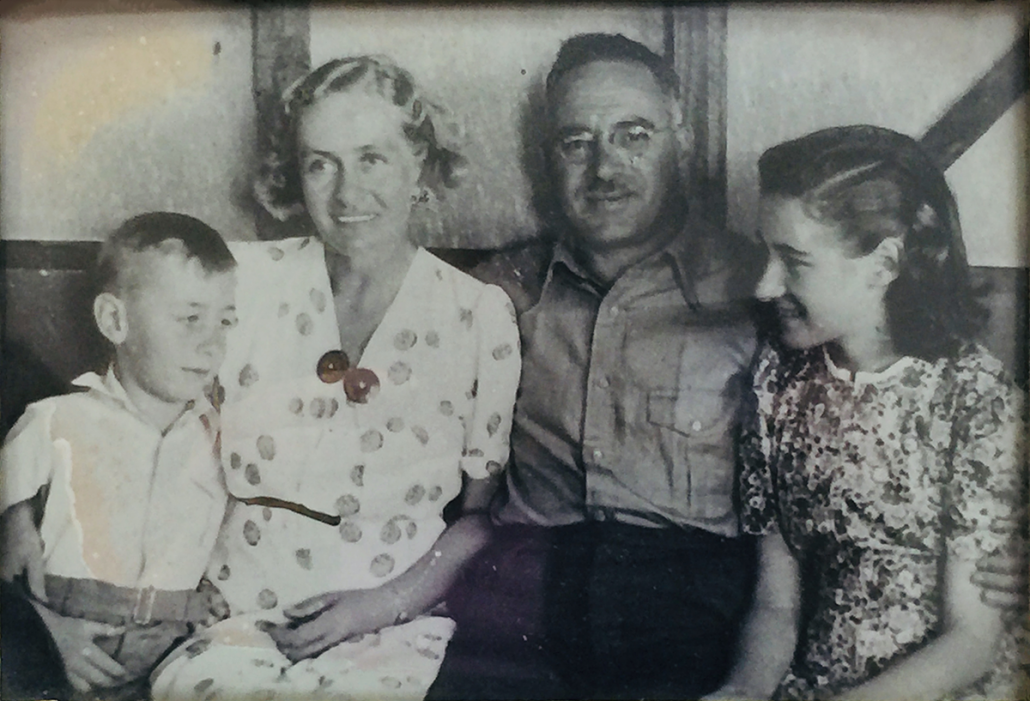My birth, to Fred (Fritz) and Julie (or Jula) Mueller in the city of Reutlingen in southern Germany on 6 January 1925, occurred in the middle of the inflation widely experienced in that country during that period. It was an extremely difficult time for all so, after a few years, my father decided to emigrate to Canada. Unfortunately, the Canadian quota for the year had been filled and, as he had been told of the “gold lying in the streets” in Australia, he decided instead to travel to that destination.
He left by ship from Hamburg in 1927, leaving behind his family, in case this life-changing trip should not be a success, and sailed via the Suez Canal to Sydney. He was extremely fortunate though, as despite the depression being rampant in Australia at that time, he was able to find employment reasonably soon after arrival. With hope of a better life, Mum and I followed him to Sydney in 1928, this time sailing around the Cape of Good Hope.
After several moves, we settled into a home in the Sydney suburb of Eastwood in 1932 where I was booked into school at Eastwood Primary, and where my brother Wally was born. By 1935, our economic position had improved markedly, so that Dad decided that he could afford a trip for the family to our homeland, and Mum, Wally and I sailed to Europe. After disembarking in Naples, we travelled by train through Italy and Switzerland to our relatives, where we spent the next months. Dad was to have come to stay for a short while, then return to Australia with us. However his joining us did not eventuate, as Hitler had decreed that Germany enter into a trade agreement with Australia, whereby each country (bartered) or exchanged goods to the same value without needing to make payment. As Dad was working for a German wool firm involved in this agreement, he could not leave Australia while the arrangements were in the process of completion.
Mum, Wally and I then left Germany in early 1936, after I had been at school in my Dad’s home town of Metzingen for three months. We travelled by train across Holland, then over the Channel to arrive in a freezing London where we waited for several days for the departure of our vessel. We arrived back in Sydney to Dad’s welcome and I returned to Eastwood school. In 1937, I became a scholar at Hornsby Girls’ High School and loved every minute of my time there.
On 3 September 1939, in my third year at high school, and just before having to sit for the Intermediate Exam, WWII broke out. We had absolutely no idea how much this would affect the family’s lives! During the night of 3 September, detectives came to intern my Dad, who, with many other German men, was classified as an “enemy alien” and first held in Long Bay Jail and other prisons, before the group was eventually taken to the Liverpool Transit Camp, an internment camp situated on the Liverpool Rifle Range where small huts had been surrounded by barbed wire fencing patrolled by soldiers. Here the internees spent the next couple of months, and we were able to visit Dad at weekends.
Wally and I, now also classified as aliens, did not return to school for some weeks, fearing unpleasantness, but I did then need to return to sit for the Intermediate exam. I passed my exam but was unfortunately unable to continue my education as we could not afford further schooling. We were able to remain in our home for the time being but, in February 1940, all the men from Liverpool were transferred to Camp 1, an Internment Camp for German men, in Tatura in the Goulburn Valley, of Victoria. As it was so far away, we were able to visit Dad only once during the next two years.
In March 1942, Mum and Wally were suddenly interned, but I was not, as by then I was 17 and thus needed a separate warrant. Initially I did not know where they had gone but found that they had also been taken to the Liverpool Transit Camp. Dad, from Tatura, and Mum, from Liverpool, applied to the authorities for my internment and I also applied for voluntary internment. However, before anything could happen, Mum and Wally were also transferred to Camp 3 in Tatura Victoria, where they were eventually reunited with Dad. After being on my own (with the cat) for four weeks, detectives came to intern me on 4 April, again in the Liverpool Camp. After another 4 weeks there, I was taken by train to Victoria and was at last reunited with my family in Camp 3, the Family Camp, in Tatura.
This camp held about 1000 internees, some from many parts of Australia, but also many German Missionary families from New Guinea, as well as approximately 600 Germans in family groups from the Temple Society, but also many Lutherans who had been brought to Australia on the ship Queen Elizabeth from what had been the British Mandate of Palestine. Many firm friends were made during the next years, as we found that the folk from Palestine spoke the same dialect as we, as they also originated from southern Germany. It was like Aussies living in a foreign country then suddenly meeting not only English speakers, but Australians!
As I had not been confirmed in Sydney before war broke out due to our pastor also having been interned, I was confirmed with eight other young people in Tatura by Pastor Hermann Schneller, the second pastor of the Lutheran Redeemer Church in Jerusalem, Palestine, and Director of the Syrian Orphanage in Jerusalem.
To our very great sorrow, September of the following year, 1943, saw the death of my Dad, who at 46 years of age, suffered a massive heart attack and was subsequently buried in the Tatura cemetery.
After four years of internment and almost nine months after the cessation of war, as we had not been granted our requested repatriation, we were released in April 1946 and travelled by troop train back to Sydney. The troops were very friendly but kept singing the pop song of the day: “Give me land, lots of land, with the starry sky above, DON’T FENCE ME IN!”. Unfortunately, we had suffered four years of just that.

Lotte Hoopmann
Times were rather difficult in Sydney, and we three lived in a succession of single rooms, needing to move five times in the next two years. Eventually we shared a large rented home with another family from “Tatura Camp”. As my brother was still at High School, and I found myself the family’s breadwinner, I was happy to have soon found work, initially sewing in a dressmaking establishment, then sewing handbags, until I was employed by friends also from “camp”, who owned a hardware importing company. Here I wrote invoices etc. until I became proficient in Customs work, which entailed the writing of customs invoices, then the clearing of tools (which had been imported from Britain and Europe), from the Sydney Customs House so that they could be unloaded from the wharves and brought to the store for sale. I worked with the firm for seven years.
In 1951, I received a letter from Bill Fugmann, a German lay missionary friend from “Tatura Camp” who had returned to New Guinea some years after his release and was in the process of transferring the stores of the Supply House from Lae to Madang at the time. He now required secretarial help and wondered if I perhaps knew of a person who would be interested in going to New Guinea. No one seemed keen, but after having heard so much about the work there while in “Camp”, I decided to accept and after a rigorous medical and the transfer of Mum to Wally’s care near Albury, I flew first to Lae, then Madang at the end of 1953.
Other than the humidity, I thoroughly enjoyed this next chapter of my life and although my contract was for two years only, I stayed on for an extra eight months. The Supply House was a hive of activity and I met almost all the mission folk who lived in New Guinea during my time there. Madang was a plane and shipping hub and, eventually, also a transit point for practically all the mission staff. Here, my work was correspondence in German and English, invoicing; also, the customs work for goods ordered from the United States, Europe, and England. I was also privileged to see much of the New Guinea countryside, as we four young employees from “The Store” were able to get about at weekends and long weekends.
One person that I did meet during that time was Eric Hoopmann, a young doctor on his way through Madang to the Western Highlands, to establish a hospital there. This meeting was to have far-reaching consequences as, although we left New Guinea at about the same time in 1956, he by plane and I by boat, only a subsequent meeting later in Albury led to our marriage and a new chapter in my life. But that is another story …
Lotte is a spritely 96-year-old at the time of publication with a wonderful sense of humour, who enjoys living in her serviced apartment at Fullarton in suburban Adelaide.


Comments 1
What a wonderful story. Resilience in abundance and a strong faith and family